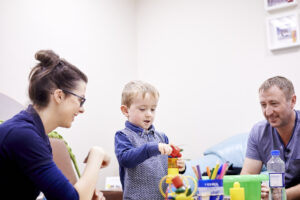
The use of language in social contexts is called pragmatics. Pragmatics includes, but is not limited, to initiating conversation, requesting and responding, topic relevance, maintenance, asking and answering questions. It is not just the words that are used when speaking but, also refers to the subtleties such as, what the speaker implied, how something is said, appropriateness and the use of eye contact, body language and intonation.
Pragmatic language skills are very important to allow clear communication of feelings, thoughts and ideas. The development of these skills occurs in conjunction with general language development.
We use our pragmatic language daily. Components of pragmatics such as eye contact and smiling develop at an early age. The unspoken conversation rules are learned through watching other’s interaction. Children learn about taking turns, engaging others and communicating important information.
Those who present with pragmatic language difficulties demonstrate difficulty with both non-verbal and verbal communication and perception of others’ communication. This can lead to difficulties with conversation and misinterpretation of the communication message. That aside, there are certain age expectations for pragmatic skills as all don’t develop together.
What then are the expected milestones for pragmatic development and how do we spot a potential social communication difficulty?
- By one year of age a child should; respond to their name, recognise familiar people, initiate communication, communicate some basic needs and engage in familiar games.
- By two years of age a child should be using words and phrases and engage in lots of non-verbal and verbal turn taking
- By aged three a child should show development in gaining attention using words, introduce topics and develop use of language to help others understand what they are saying. These skills continue to develop over the years.
Children who present with Autism Spectrum Disorder frequently have difficulties with pragmatic skills and social interaction. Pragmatic difficulties often co-occur in children with general language disorders.
What can we do to help?
Children who present with these difficulties should not be expected to just acquire the skills which they lack without intervention. Lack of specialised support can result in a child experiencing many stressful social encounters. A Speech and Language Therapist can assist by providing useful ideas to support skill development, initially in a one to one scenario, but overall, these approaches work best in conjunction with parent involvement.
Parents are good role models in real situations and social communication skills are best practised in real life scenarios. Activities that include turn taking, identifying and talking about different feelings in real life situations and supporting and facilitating social play, all help.
Additionally, visual supports can be of great help to explicitly teach certain social situations. Social Stories such as those produced by Carol Gray are very useful especially if they are role played later. Social skills can then be actively practised in a secure way before being transferred outside of practice into real life.
If you have any concerns regarding pragmatic language development, don’t hesitate to contact a Speech and Language Therapist. Ultimately, a therapist, trained in intervention for pragmatic development, can provide great support.
References
Gard, A., Gillman, L., Gorman, J., and other sources, (2000). Pragmatic Language Developmental Milestones.
Pragmatic Language. Retrieved on 3rd March 2018 from http://www.therabee.com/images-pdf/pragmatics-jul08.pdf
Pragmatic Language Assessment Guidelines A Best Practice Document. Retrieved o 3rd March 2018 from https://www.rchsd.org/documents/2014/04/pragmatic-language-cochlear-implant.pdf
Written By
Elaine Baldwin, Senior Speech & Language Therapist at Sensational Kids, Clonakilty
Copyright Sensational Kids CLG 2018

